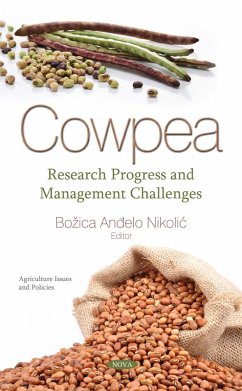Cowpea is a versatile crop that is well-adapted to poor conditions. This, combined with its high nutrition value, gives cowpea the potential to mitigate the effects of climate change and save millions of people from hunger and malnutrition. In Cowpea: Research Progress and Management Challenges, the authors discuss how the increased productivity of cowpea can enhance agribusiness opportunities for people in developing countries and lower costs while increasing income under changing climate conditions.Promising cowpea cultivars are under great threat for profitable cultivation due to the attack of factors such as: fungi, bacteria, viruses, nematodes, nutritional deficiency toxicity, water stress and temperature. Thus, this compilation reviews the present status of fungal and bacterial diseases of this important crop.Next, recent developments about the plant are reviewed which show high recalcitrance to in vitro regeneration and genetic transformation, using different genes of interest, since the 1980s. The main focus of the study included a comparison of protocols for sterilization, types of explants used, growth mediums, cultural conditions, rooting, acclimatization and genetic transformation of cowpea.The authors also discuss the biological and pharmacological aspects of cowpea. Some health benefits include toning the spleen, stomach and pancreas, helping induce urination and relieving damp conditions. Cowpea contains the highest concentration of antioxidant compounds. It also has a small amount of iron, sodium, zinc, copper, manganese and selenium.Next, this collection focuses on how cowpea bean protein hydrolysates are obtained, their pharmacological activities and potential toxicity, as well as the potential inclusion of protein hydrolysates or biopeptides into products where they may act like health promoting functional foods/dietary supplements.The authors propose that efforts should focus on the search for increasingly localized, highly effective inoculants adapted for particular cowpea cultivars over a given environmental setting. To demonstrate this, a review is included which will analyzes some of the most pertinent challenges in the search and development of effective cowpea inoculants and suggestions on the way forward.In conclusion, research on the utility of cowpea based diets in domestic ruminants is reviewed, and the translational impacts of these studies for food security and safety and public health has been highlighted.
Dieser Download kann aus rechtlichen Gründen nur mit Rechnungsadresse in A, B, BG, CY, CZ, D, DK, EW, E, FIN, F, GR, HR, H, IRL, I, LT, L, LR, M, NL, PL, P, R, S, SLO, SK ausgeliefert werden.









